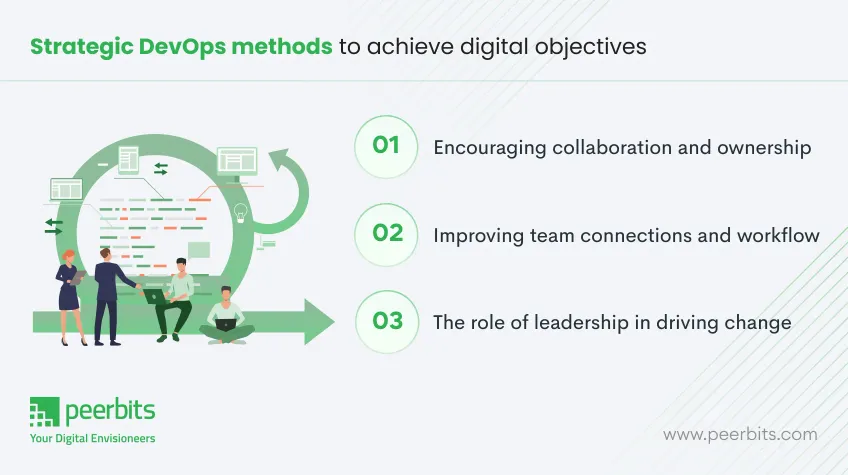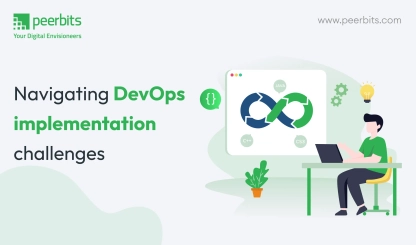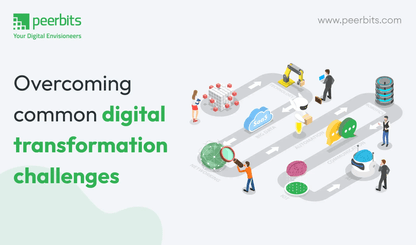Digital transformation refers to the integration of digital technologies into various aspects of a business to improve operations and deliver value to customers.
It is more than just adopting new tools—it’s about reimagining processes, workflows, and customer experiences to remain competitive in growing market.
As industries like healthcare, finance, and retail adapt to this shift, businesses are under constant pressure to innovate quickly, meet customer demands, and maintain operational efficiency.
This need for speed and adaptability has made DevOps services a cornerstone of successful digital transformation strategies.
DevOps accelerates digital transformation by bringing development and operations teams together, eliminating barriers to innovation. It improves collaboration, supports faster delivery, and ensures reliability, driving continuous progress and business growth.
But first let's understand what digital transformation means in the IT world.
What is digital transformation?
Digital transformation refers to the integration of digital technologies into all areas of a business to fundamentally change how it operates and delivers value to customers.
It goes beyond simply adopting new tools; it involves rethinking existing processes, improving efficiency, and finding new ways to meet customer demands.
The main goals of digital transformation include:
- Agility: Helping businesses respond quickly to shifts in the market and customer preferences.
- Innovation: Utilizing technology to create new products and services that meet customer needs.
- Customer-centricity: Prioritizing customer needs and ensuring that their experiences are seamless and personalized.
Many industries are actively undergoing digital transformation to stay competitive.
- Retail: Companies like Amazon and Walmart are improving shopping experiences through AI-powered recommendations and faster delivery systems.
- Healthcare: Healthcare providers are adopting telemedicine and digital health records to improve care and increase operational efficiency.
- Finance: Banks are using digital payment systems, online services, and blockchain technology to make financial transactions more secure and accessible.
As businesses embrace digital tools, they are changing how they operate and how they connect with customers.
How DevOps accelerates digital transformation?
DevOps is a set of principles that brings together development and operations teams to work more effectively and collaboratively. DevOps plays central role in digital transformation by focusing on key elements like automation, collaboration, and continuous improvement.
Automation:
Automating repetitive tasks—like testing, deployment, and infrastructure management—ensures that processes are consistent and faster.
This reduces human error and frees up teams to focus on more strategic tasks, allowing for quicker product delivery and more frequent updates.
Collaboration:
In traditional setups, development and operations teams often work in isolation, leading to communication barriers and slower response times.
DevOps encourages cross-functional collaboration, where teams share responsibilities and work closely together, creating a more unified way to achieving business goals.
Iterative improvement:
DevOps focuses on continuous feedback and small, incremental changes. This allows businesses to make ongoing improvements to products and services.
Instead of waiting for large updates, companies can keep up with the fast-paced demands of digital transformation.
This integrated way speeds up processes, encourages innovation, and lets businesses quickly adapt to customer needs or market shifts. As a result, DevOps is an essential driver of change, helping organizations move faster and more effectively in the digital era.
Strategic DevOps practices for achieving digital goals
DevOps practices form the foundation of successful digital transformation by streamlining workflows and improving the delivery of applications and services. Here are the core practices that significantly contribute to this transformation:

1. Continuous integration and continuous deployment (CI/CD)
CI/CD pipelines automate the integration of code changes and the deployment of applications, letting teams to release updates faster and with greater reliability.
Businesses can maintain the equality and functionality of their applications while meeting market demands by identifying and resolving issues earlier.
2. Automation of infrastructure and configuration management
Using Infrastructure as Code (IaC), businesses can automate the management and provisioning of their infrastructure.
This ensures consistency across environments, reduces manual errors, and speeds up the deployment process, making operations more efficient. Monitoring and observability
3. Monitoring and observability
Real-time system monitoring and observability help teams detect and address performance bottlenecks.
With dashboards and alerting systems, businesses can optimize their applications and maintain service availability without disruptions. Agile development practices
4. Agile development practices
Agile methodologies prioritize iterative development and regular feedback, helping teams adapt to changing market demands.
This strategy promotes faster delivery cycles and ensures that customer expectations are met consistently.
5. Security integration (DevSecOps)
Businesses can identify vulnerabilities early and reduce risks by embedding security and practising DevSecOps into the development process from the beginning.
This focus on security improves application reliability and builds trust with end-users.
These practices not only support smoother operations but also create a framework for ongoing improvement, making them indispensable for digital transformation.
DevOps and cultural transformation
DevOps is as much about changing organizational culture as it is about technology. It changes how teams collaborate, creating an environment built on teamwork, shared responsibility, and accountability.

1. Encouraging collaboration and ownership
DevOps brings development, operations, and QA teams together to work toward shared goals. This shift inspires a collective sense of responsibility for projects, helping teams work efficiently to achieve objectives.
Team members feel more connected to the outcomes, leading to better results.
2. Improving team connections and workflow
In many organizations, development, operations, and QA teams work in silos, causing delays and miscommunication. DevOps bridges these gaps by integrating teams.
This connection improves workflows, speeds up problem-solving, and supports faster delivery of high-quality outcomes.
3. The role of leadership in driving change
Leaders play a key role in guiding the cultural shift required for DevOps success. They set the direction, provide resources, encourage open communication, and demonstrate the advantages of teamwork.
Their support helps teams adjust to this way of working and maintain steady progress.
Cultural transformation through DevOps changes how organizations function by connecting teams and improving workflows. This shift helps businesses stay adaptable and innovative.
Benefits of adopting DevOps in digital transformation
The adoption of DevOps during digital transformation offers significant advantages that drive business success. Here are some of the key benefits:
1. Improved cross-functional collaboration
DevOps brings together teams from different functions, such as development, operations, and QA, to work toward shared goals.
This collaboration improves communication and minimizes delays caused by misaligned efforts, resulting in smoother workflows and better project outcomes.
2. Faster delivery with reduced risk
By automating key processes like testing, deployment, and infrastructure management, DevOps enables businesses to release updates more frequently and with fewer errors.
This reduces the time required to bring new features or services to market while maintaining quality and reliability.
3. Scalability for changing needs
DevOps equips organizations with the tools and practices needed to adapt to growing demands or shifts in customer expectations.
Its focus on automation and efficient resource management lets businesses scale their systems without compromising performance.
4. Improved user experiences
Through practices such as continuous monitoring and rapid feedback, DevOps ensures that digital services remain dependable and responsive.
Customers benefit from consistent, high-quality experiences that build trust and satisfaction.
The integration of DevOps into digital transformation strategies not only supports faster delivery and better collaboration but also positions businesses to meet market demands effectively and keep customers engaged.

Challenges in adopting DevOps for digital transformation
Adopting DevOps as part of digital transformation can come with obstacles that organizations need to navigate thoughtfully.
Adapting to cultural change
Transitioning to a DevOps-focused environment requires altering how teams interact and share responsibilities. Team members may hesitate to adopt new workflows due to comfort with existing practices.
Actionable tip: Start with smaller projects to demonstrate the effectiveness of DevOps practices. Use these successes to encourage broader adoption and create momentum for change.
Handling legacy systems
Many organizations rely on older systems that can be difficult to integrate with modern DevOps practices. These systems may not support automation or other essential elements, leading to operational challenges.
Actionable tip: Focus on updating critical parts of older systems in stages. Use tools and processes that support both older and newer technologies to maintain continuity during the transition.
Filling knowledge gaps
The adoption of DevOps often requires expertise in automation, monitoring, and continuous deployment. A lack of these skills can delay progress and affect outcomes.
Actionable tip: Provide ongoing learning opportunities, including workshops and certifications, to equip teams with the knowledge needed to adopt DevOps successfully.
Organizations can integrate DevOps practices effectively and connect them to their transformation goals by addressing these challenges step by step.
Read more: DevOps Implementation: Top challenges & their proven solutions
Trends and future of DevOps in digital transformation
DevOps is incorporating advanced technologies to meet the growing demands of digital transformation. These developments are changing the way, how organizations manage and optimize their processes.
GitOps: Modernizing infrastructure management
GitOps focuses on managing infrastructure configurations through Git repositories. It introduces a structured and consistent way to handle deployments, making infrastructure management more organized and reliable.
Predictive analytics for better operations
Predictive analytics is changing the way systems are monitored and maintained. By analyzing past data, it identifies potential issues early and helps teams take preventive actions. This minimizes downtime and keeps systems running smoothly.
AI and Machine Learning in DevOps
Artificial intelligence and machine learning are transforming DevOps by enabling smarter tools and processes. These AIOps technologies assist in tasks like anomaly detection, resource planning, and automating repetitive workflows. This results in more efficient operations with fewer manual interventions.
Advancing the role of DevOps in digital transformation
These innovations indicate the growing relevance of DevOps in helping businesses adapt to fast-changing environments. Organizations adopting these practices gain better agility, quicker delivery cycles, and improved system performance.
Businesses can make strategic decisions to keep pace with technological advancements and deliver exceptional digital experiences by staying informed about these trends.
Conclusion
DevOps plays an important role in ensuring the success of digital transformation efforts. It integrates practices that focus on teamwork, automation, and continuous refinement. These efforts help businesses deliver results faster and with greater reliability while staying responsive to ever-changing demands.
Adopting DevOps is a strategic decision that supports continuous progress and long-term growth. For organizations aiming to remain competitive, embedding DevOps into their digital strategies is essential to achieving lasting success in an increasingly digital landscape.









